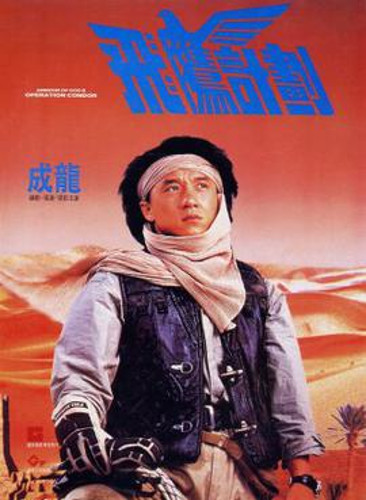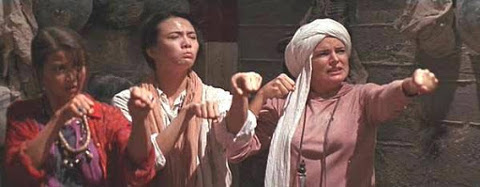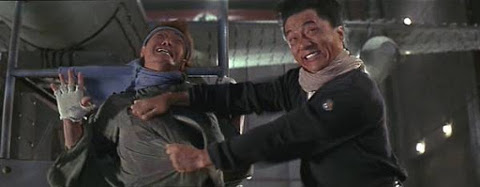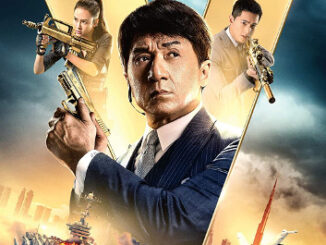Armour of God 2: Operation Condor (1991)
Directed by: Jackie Chan
Written by: Edward Tang, Jackie Chan
Starring: Carol Cheng, Eva Cobo, Jackie Chan, Shôko Ikeda
AKA FEI YING GAI WAK
HONG KONG
AVAILABLE ON BLU-RAY AND DVD
RUNNING TIME: 117 mins/115 mins/107 mins/83 mins
REVIEWED BY: Dr Lenera
After barely surviving his last adventure, treasure hunter Jackie is asked by Baron Bannon to locate a secret base in the Sahara Desert which supposedly contains 240 tons of gold hidden there by German soldiers led by Hans von Ketterling during World War 2. He’s promised one percent of the treasure, but has to be partnered with Ada, a Chinese expert in African geography. As the journey takes them from Spain to North Africa, they acquire two more young ladies; the German Elsa who’s von Ketterling’s granddaughter, and the Japanese Momoko who’s searching for the meaning of death [honestly, that’s what she says]. But somebody doesn’t seem to want them to reach their destination….
Is it a sequel or a reboot, that is the question? In Jackie Chan’s 1986 hit The Armour Of God, his character was called Asian Hawk. Here, he’s called both Condor [even Mr Condor] and Jackie, so I guess his name is Jackie Condor, which makes me wonder if I should classify this as a reboot, not a sequel, even though it was marketed as a sequel. While clearly being influenced even more by the Indiana Jones series especially Indiana Jones And The Last Crusade, it largely comes across as a more elaborate remake, with even its structure virtually replicating the first film’s: exciting opening sequence followed by exposition and intrigue, followed by another major action scene before the emphasis shifts more to comedy until the final section which brings back the thrills with a vengeance. And it’s unusual for me to review the supposed sequel to a film before I’ve reviewed its predecessor, but then the original movie hasn’t yet had a super dooper Blu-ray release. Despite this unevenness in pacing which Chan’s self-directed projects do tend to possess, and this one being rather longer than the first, Armour of God 2: Operation Condor strikes me as being the better film. Chan seems to be doing all he can to make a fun ride for the audience, including cramming the movie with gags, some of which work well, some of which don’t so much, but even when he’s not kicking ass and doing crazy stunts the film is never dull. Chan’s most expensive production also looks pretty good when compared to similar Hollywood efforts of the time which would have still been far costlier.
The expensive Miracles: The Canton Godfather wasn’t the smash expected and didn’t get much interest overseas, so a sequel to a popular earlier film seemed like a good idea. Golden Harvest head Raymond Chow struck a deal with Chan: if he could complete the production in six months on a budget of HK $40 million, he’d give him an extra $4 million. However, the budget ended up being $75 million more than intended, finally reaching $115, and, for once, Chan didn’t have a film out in 1990, the shooting taking 18 months. In Morocco, extras spent prop money, so the production manager was arrested and held in custody for three months for distribution of counterfeit currency, and the film reels seized. The desert location was over 12 hours drive away from the nearest city, Casablanca, and people going to collect and bring supplies would often get lost for days. Editing and post-production couldn’t be done on set as with most Hong Kong films, so film was sent be developed every two days to a laboratory in Madrid which was even further away. Two cans of film went missing then suddenly turned up. Some of the cast and crew contracted a disease and were stung by scorpions. Eventually a fed up Chan moved the production to Hong Kong to which ten tons of sand was transported, but the huge propeller used in the climax kept breaking as soon as it was turned, and Chan dislocated his sternum while falling off a chain. Thankfully commercial success ensured, though the 1997 American theatrical release, which removed Momoko’s introductory scene, and cut 15 minutes of comedy and [would you believe it?] action [heavily truncating the two final set pieces], and added a new dub and score, did disappointing business. As was sometimes the case, Japan saw a longer version, running an extra 8 minutes.
We begin again with a prologue mini-adventure, with Condor strapping on a hang-gliding outfit powered by an airplane engine, fires it up, and runs with mounting desperation across a meadow, trying to get airborne, which he eventually, he does. In most films, the flight would have been effortless, but it’s more fun to watch Chan having some trouble, and that’s one reason why he’s so likable. He explores some caves for some large green gems. The natives seem happy to let him take them, but when he drinks some water they want him marry a very large woman. The fleeing Condor escapes in a huge balloon that rolls down a mountain with him in it. There’s no martial arts at all in this whole sequence, though there a few goofy gags like Condor scaring off a native with a picture of a tiger while a growl is heard on the soundtrack, something that would also fit in to a Roger Moore James Bond film. 88 Films somehow got hold of a rare extended version of this movie that was two minutes longer than the Japanese version. There are no extra scenes, but loads of tiny scene extensions, such as the tiger scaring off two natives rather than one. Then, just after Condor had been sent on his mission with “desert expert” Ada, we also see exactly how Condor breaks into a house soon after in Madrid, something we didn’t before. It’s where Elsa lives, leading to a lengthy comedic set piece involving two villainous but incompetent Arabs from the ‘National Liberation Front’, Condor and Elsa.
After a montage where our travelers go from place to place, do silly things and pick up other travelers on the way including Momoko whom they just happen to run in to, We get to the longest sequence in terms of humour that takes place in a North African [we’re never told a country] hotel where Condor, Elsa, Ada, the Arabs, two German bad guys and a hotel manager who gives out condoms all get mixed up in an escalating farce. The funniest bit is when Condor and Ada pretend to the Germans that they’re about to have sex while Ada tries to signal to Elsa that they’re in trouble – so she brings a gun hidden in a cake but covers it with too much tape to be usable. Perhaps the scene goes on too long, but Chan brings in tiny bursts of fighting and even here, such as Chan’s juggling act with the gun, the choreography is very complex, and Chan will do anything for a laugh – something which doesn’t matter too much because if one gag doesn’t work, the next one probably will. While slightly risque humour existed in previous Chan films, it’s sometimes slightly ruder in this one, and we even get a nude backside which was ‘zoomed in’ for the Hong Kong release but was unaltered elsewhere. The American version inexcusably removed an amusing scene when Condor surreptitiously gives the three women water while under gun point from the two Arabs, who get the impression that they’re getting horny, with the ladies gagging for more water and one of them wrapping her legs around Condor. It’s actually funniest in the English dubbed version, with dialogue like “I don’t want to”, “you will when I get started”.
After the opening, the first big action sequence is a tremendous chase through Madrid with six cars pursuing Chan on a bike which goes all over the place, reaching what seems like a peak with what might be Chan’s variant on a scene from Battleship Potemkin, except that his character of course picks up the top half of the pram that’s stuck in the middle of the road and hands it back to the mother. Then it’s topped by him doing a back flip to avoid cars jumping at him, then driving off a pier to jump on a net hanging from a crane. Chan does what he sometimes does and shows the stunt three times. Yep, he’s showing off, but it’s amazing to watch so I can forgive him [the audio commentary claims it wasn’t him doing these two stunts, though offers no proof]. However, for some time, it seems that Chan is deliberately teasing fans, with fighting being relatively plentiful but extremely brief. He even twirls a spear thrown at him, leading one to expect that he’s also going to show off his fighting skill with the weapon, but it doesn’t happen. However, even if by now Chan does more running away than full offensive fighting, eventually we get some proper brawling once we get to the underground bunker, a classic set for Chan action full of levels and a huge generator made of three moving panels which Chan and his foes must balance on. Of course every character pauses when a missile rolls on the floor, then when it fails to cause an explosion and just hits a wall very softly, everyone continues to pause for a couple of seconds before going back to fighting again. And then we have the wind tunnel finale where folk are blown all over the place, inspired by a visit to a Mitsubishi car factory which had a tiny version of the admittedly improbable thing you see in the movie, and, just maybe, the climax of Total Recall. Who cares that there’s obvious wire work in shots where Chan flies around like Superman; it’s just so much fun to watch.
Two of the women being captured and then rescued has little point to it, geography becomes very strange, and there’s a sense that Chan and his usual screenwriter Edward Tang lost control of the story a bit. The fact that all three women seem to only share one brain is rather demeaning, but Carol Chen possesses some nice comic timing; Eva Cobo and Shôko Ikeda less so, though all three do work fairly well together. They get slapped and punched a great deal, though I just see it as the women being treated the same as the men, As for Chan, he’s very hammy; granted, that’s his style, and his goofiness is one thing that usually makes him do endearing, but there’s also usually a slight edge to his characters, something that’s missing here – perhaps a sign of his weariness. At least he still makes climbs, jumps and swings with what looks like effortless ease. Arthur Wong, one of the most prolific but also one of the best of Hong Kong’s cinematographers, lenses the desert quite beautifully, and one can usually tell where the money went in this film, except for Chris Babida’s music score. His sometimes Middle Eastern-infused tracks are quite catchy, and his under-used theme for Condor even rousing, but it all sounds like it’s being played on the cheapest synthesiser possible, something which lessens the effect of the music. And the English dubbed version benefits from having two less-than-great songs being heard without the vocal parts. Armour Of God 2: Operation Condor wore Chan out so much that he didn’t properly direct another film on his own until 2011’s Chinese Zodiac which was the not-exactly-great third film in this franchise, though he couldn’t stop himself from sometimes taking over productions anyway. But it was worth the effort; I don’t think that it’s quite in Chan’s top ten, but it’s one that keeps me smiling more than many of his others – even if the very last scene, while on the surface being just another joke, is actually really downbeat, with little hope at all!










Be the first to comment